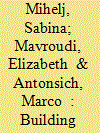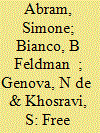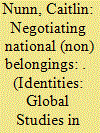|
|
|
Sort Order |
|
|
|
Items / Page
|
|
|
|
|
|
|
| Srl | Item |
| 1 |
ID:
152443


|
|
|
|
|
| Summary/Abstract |
Nation and diversity are often cast in oppositional terms. The present joint intervention explores the limits and possibilities of what we call ‘inclusive nation’, i.e. a nation which embraces rather than expunging diversity. To reflect on this idea, the Loughborough University Nationalism Network (LUNN) organized a symposium, bringing together both academics and relevant stakeholders, to explore both theoretically and practically the feasibility of the inclusive nation. For reason of space, here we present only the theoretical views of academics. While Billig and Yuval-Davis highlight the inherent exclusive thrust of nationalism, Kaufmann and Hearn suggest two distinct ways to move away the traditional understanding of nationalism as a site of singularity, oppression and exclusion. A final rejoinder by Nyhagen pushes the debate further interrogating the boundaries of national belonging.
|
|
|
|
|
|
|
|
|
|
|
|
|
|
|
|
| 2 |
ID:
152442


|
|
|
|
|
| Summary/Abstract |
This article contains the text and discussion of a debate held at the IUAES World Congress in Anthropology at Manchester University in 2013. The motion was proposed by Bela Feldman-Bianco (State University of Campinas), seconded by Noel Salazar (University of Leuven) and was opposed by Shahram Khosravi (Stockholm University), seconded by Nicholas de Genova (then at Goldsmiths’ College). The debate was chaired by Simone Abram (Durham University).
|
|
|
|
|
|
|
|
|
|
|
|
|
|
|
|
| 3 |
ID:
152446


|
|
|
|
|
| Summary/Abstract |
Many immigrant-receiving countries are characterised by increasing multigenerational ethnocultural diversity, with associated policies and discourses of inclusion. Yet they often simultaneously resist relinquishing narratives and practices grounded in idealised notions of ethnocultural homogeneity. This results in the circulation of multiple, often competing, ideas of the nation, with significant implications for national (non)belonging among migrants and their descendants. Based on interviews with members of seven Vietnamese Australian families, this article explores their discursive navigation of two competing ideas of Australia: as ethnocultural and multicultural. Applying a conceptual framework of belonging that attends to the relation between the personal and the political, this article demonstrates that, for migrants and their descendants, national (non)belonging is a dynamic and dialogic process of negotiating multiple national spheres, each governed by different politics and offering different possibilities for belonging. The multigenerational interview cohort additionally provides insights into the role of migration generation in mediating this process.
|
|
|
|
|
|
|
|
|
|
|
|
|
|
|
|
| 4 |
ID:
152444


|
|
|
|
|
| Summary/Abstract |
This article explores how fathers in couple relationships where their partner is from a different racial background understand bringing up their children. Drawing on a small-scale, in-depth comparison of fathers’ accounts in Britain and New Zealand, and using the analytic concept of racial projects, fathers’ activities towards and hopes for their children’s identity and affiliation are revealed as keyed into historically situated social and political forces. Particular national racial projects and histories of coloniser and colonised are (re)created and reflected in the various typifications (ideal orientations) informing the fathers’ racial projects. These might be concerned with mixed, single or transcendent senses of belonging, in individual or collective ways, each of which was in various forms of dialogue with race.
|
|
|
|
|
|
|
|
|
|
|
|
|
|
|
|
| 5 |
ID:
152445


|
|
|
|
|
| Summary/Abstract |
In this article I assert that the importance of names within the process of racialisation has been under-explored in the UK context. I consider data from seven qualitative interviews, which suggest that names are racialised in the UK and that this racialisation can affect the naming choices of multiracial/ethnic parents. My participants indicated that, when choosing children’s forenames and surnames, there are juxtaposing concerns: a fear of potential discrimination faced by children on the basis of them bearing a ‘foreign’ name, and a desire to reflect the children’s multiracial and/or ethnic heritage. I describe and discuss two consequential strategies that my participants suggested: to give the child a white British name in an attempt to help them pass as white British, or to oppose the fears of racism/discrimination and give them a name that displays their Otherness. I discuss these ideas in relation to racial passing and whiteness literature.
|
|
|
|
|
|
|
|
|
|
|
|
|
|
|
|
|
|
|
|
|